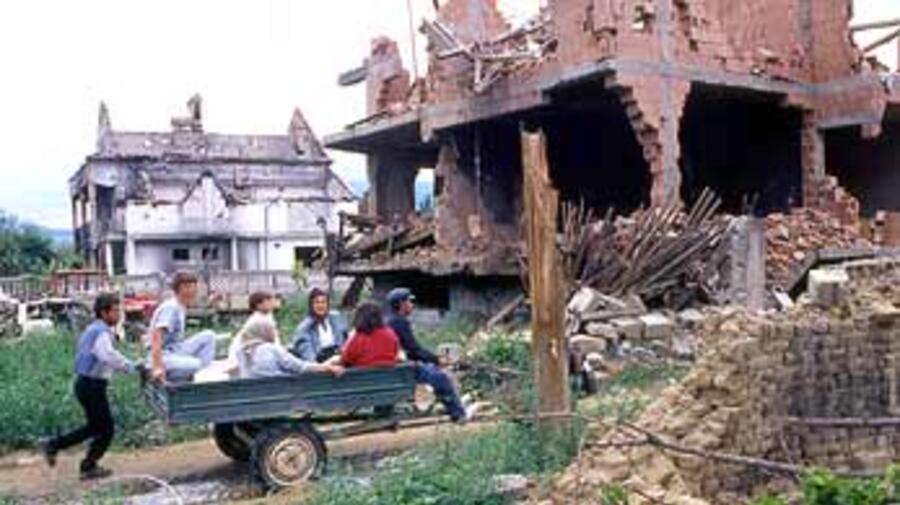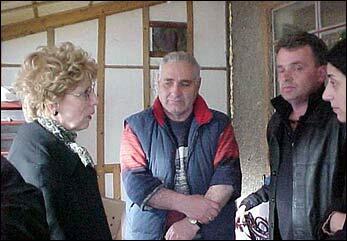Feature: Fresh start for mixed community in Kosovo
Feature: Fresh start for mixed community in Kosovo

Kosovo's residents returning home to the ethnically-divided Mitrovica in 1999.
KODRA E MINATOREVE/MIKRONASELJE, Kosovo (UNHCR) - Zeqir Rushiti decided to call his business "Start" because he hoped that "coming back would mean a new start, after the war, the bombing, the hate, the suffering."
Rushiti, a 55-year-old Kosovo Albanian, says, "It's difficult, but so far we've managed somehow." In 2000, he opened a little shop selling coffee and roast chicken in Kodra e Minatoreve/Mikronaselje, an ethnically-mixed neighbourhood up on the hill in North Mitrovica.
Divided by the Ibar river, Mitrovica became a symbol of the ethnic divide between the Albanians living in the city's south, and the Serbs concentrated in the northern sector. In the complex North Mitrovica, however, the community in Kodra e Minatoreve/Mikronaselje offers an interesting example of co-existence among Albanians, Serbs and Bosniaks (a Serbo-Croatian-speaking Muslim minority group).
Like many of his neighbours, Rushiti had fled his home in the summer of 1999. But he returned immediately after the conflict, when NATO troops entered Kosovo. "Since then, we've managed to lead a normal life without major problems. We worked a lot by ourselves, and we didn't receive much help or support from our politicians or the international community," he says.
Neno Maric, 37, is Rushiti's counterpart in the Kosovo Serbian community in Kodra e Minatoreve/Mikronaselje. They have been friends for a long time, working together for the community to function as a whole. Maric owns the only bakery in the neighbourhood and employs one Serb, one Albanian and one Bosniak.
"There are still many extremists who don't like what we are trying to do," says Maric. "But they don't live here as we do. We need to build a future for ourselves."
The ethnic balance in the community is delicate - more than 1,000 people comprising 52 Kosovo Albanian, 65 Serb and 47 Bosniak families - and the two men know how important it is to maintain it. Rushiti notes there are still 200 Albanian families currently displaced from Kodra e Minatoreve/Mikronaselje, adding that balance is key for the safety of the community.
"We would like everyone to have the chance to return home, but they have to be from here. We don't want people from other places to show up and try to settle here," says Maric. "We need to think about the community and what we have achieved so far. That's why we refused any project benefiting only one side. If something is done, it has to be for everyone."
The two men are currently working with the UN refugee agency to raise funds to build a bigger community centre after the old one was burned down. They are also planning to set up a small restaurant.
UNHCR protection officer Marie-Noelle Little observes, "What is important here is the fact that the two leaders work closely together to protect the interests and the well-being of the community as a whole."
But co-existence remains a daily challenge. In Kodra e Minatoreve/Mikronaselje, children under sixth grade attend different classes in the small community school. Aside from language differences between the ethnic groups, there is also a different school system - Kosovo adopted its own curriculum in 2001, while the Serbian areas have retained the Belgrade curriculum.
The small clinic in the neighbourhood employs two nurses, one Kosovo Albanian and one Kosovo Serbian, which is handy because the ethnic Albanians do not use the hospital in Serb-populated North Mitrovica. "It's 200 metres from here, but in case of emergency, an ambulance goes south with a police escort," says Rushiti with a sad smile.
While the Kosovo Albanians are free to move around the neighbourhood, their movements elsewhere are limited. Three times a day, the international Kosovo Force (KFOR) escorts them south for shopping and other activities.
But in a sign of normalisation, KFOR removed fixed checkpoints at the two main entrances of the neighbourhood in January this year, replacing them with mobile control points. KFOR and police from the UN Mission in Kosovo (UNMIK) patrol the area regularly, and there have been no major security problems so far.

UNHCR's Deputy High Commissioner Mary Ann Wyrsch (left) with community leaders Zeqir Rushiti (centre) and Neno Maric in Kodra e Minatoreve/Mikronaselje.
In April, UNHCR's Deputy High Commissioner, Mary Ann Wyrsch, visited Kodra e Minatoreve/Mikronaselje while on mission in the Balkans. "This community is an encouraging example of inter-ethnic dialogue and co-operation. Everyone should work for it to become a daily reality, not an exception," she said.
From the top of the hill, an imposing Yugoslav-era monument dedicated to miners from the area's Trepca industrial complex seems to keep a constant eye on the community. "A lot of people here used to work in the mines," says Rushiti. "They are all unemployed now, but we need stability if we want economy, and we are trying our best."
By Monica Ellena
UNHCR Kosovo









